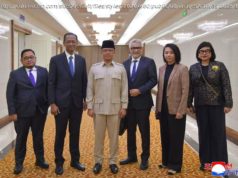Humiliating the regime (again) would be a mistake.
This week, South Korea accepted North Korean leader Kim Jong Un’s offer of „urgent“ talks over his country’s participation in the 2018 Olympic Games in Pyeongchang. Although the sudden engagement over what might amount to two figure skaters crossing the border may not seem like a big deal, history suggests that ignoring the entreaty could be a major missed opportunity.
To understand the significance of these talks, it’s worth remembering the last time the Olympic Games were held on the Korean peninsula, in 1988. The International Olympic Committee’s decision to award the games to Seoul that year came as a surprise. At the time, South Korea was emerging from a coup and bloody demonstrations. Its economy was in tatters, the Soviet bloc was refusing to recognize it diplomatically, and tensions with North Korea were soaring.
It was also a perilous moment for the broader Olympic project. Both the 1980 Moscow Games and the 1984 Los Angeles Games had been tarnished by Cold War-era boycotts. There were serious fears that yet another boycott, this time in support of North Korea, could permanently undermine what legitimacy the Olympic movement still had.
For South Korea’s leaders, this presented a risk — but also an opportunity. If they could successfully shepherd the games, the thinking went, they might rebuild their reputation globally while also placing the North at a strategic disadvantage. That might be worth risking a walkout by countries friendly to Pyongyang.
As it happened, a boycott wasn’t what North Korea had in mind. According to a July 1985 memo by an IOC representative, the North’s leaders „felt that if they boycotted the Games they would perhaps earn the odium of the whole world and the best way to prove the other side wrong was to ask for a unified team.“ They ultimately went much further than that, proposing that hosting duties be split between North and South and the games be renamed the „Korea Pyongyang Seoul Olympic Games.“
The South was never going to go for that. But wariness over a boycott and the threat of violence at the games did spur counteroffers. The most generous was delivered informally by the IOC in 1986, suggesting that North Korea could host the soccer, archery and table tennis events at the games.
Had the North accepted, it might’ve alleviated its growing international isolation, at least somewhat. Instead, it spent almost two years pressing for more. That was a strategic error: As negotiations dragged on, the Soviets and their allies undermined the North’s position by signaling that they planned to attend the games in any event. Hardliners in the South were more than happy to let negotiations die. A May 1988 memo from an IOC negotiator summed up Seoul’s viewpoint as: „Let’s humiliate the North with a highly successful Olympics in the South, then we will be able to negotiate from strength.“
That, too, turned out to be a miscalculation. The 1988 games were highly successful insofar as they burnished the South’s reputation. But humiliating the North only served to strengthen the Kim regime’s resolve to withstand international pressure, and build up its military and nuclear capacity. Thirty years later, there’s no way to know if sharing even a small part of the 1988 Olympics would’ve altered that dynamic — but it’s clear that choosing humiliation over cooperation didn’t help.
That history was surely on the mind of South Korean President Moon Jae-in last summer, when he proposed a joint North-South Olympic team for Pyeongchang. North Korea rebuffed the overture, noting that organizing a combined team for a 1991 ping-pong tournament required 22 rounds of talks over five months.
As the games approach, however, it’s clear that the North is having second thoughts about being excluded from another Olympics hosted by its neighbor. The talks may lead nowhere. But the South should keep an open mind. There are precious few opportunities for the bitter rivals to engage in dialogue and goodwill. And the Olympics provide a rare venue to find common ground — on a matter that doesn’t involve life and death.
To contact the author of this story: Adam Minter at aminter@bloomberg.net
To contact the editor responsible for this story: Timothy Lavin at tlavin1@bloomberg.net






